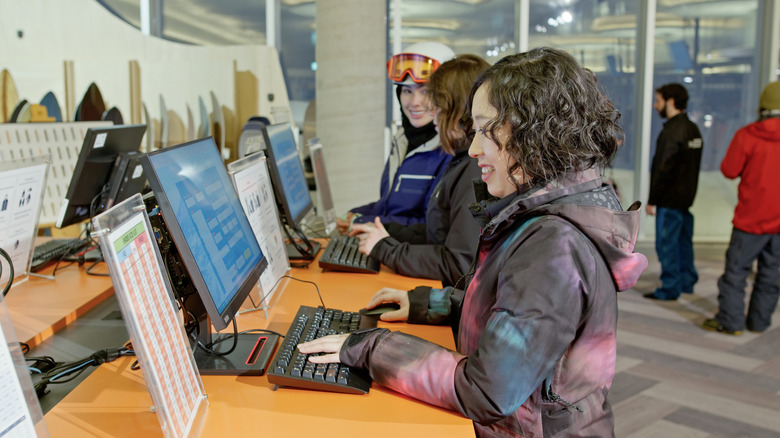Rick Steves Shares One Essential Tip For Internet Safety On Public Computers In Europe
Most travelers these days carry smartphones, tablets, or laptops with them to stay connected on the move. Sometimes, though, you might find yourself in a situation where you need to rely on a public computer. It could be for something as simple as needing to print travel documents, which your phone may not be able to do, or it might be a lifesaver for something unexpected, like your phone losing battery or service at a critical time. Rick Steves, who's offered travel safety tips from not getting pickpocketed on your Europe trip to brilliant advice for making train exploration with luggage easier, has a tip for safe public computer use, too. He says to avoid logging into personal accounts.
On his blog, Steves writes, "It's perfectly safe to check train schedules, maps, or museum hours on a public computer. The danger lies in accessing personal accounts that require a login and password." The reason for Steves' concern is quite simple: Scammers can steal your personal information. If you enter your username and password for personal accounts into a public computer, browsers store that data so that the next user (or scammer) could access it. Even more covertly, scammers could have keylogging tools installed to track what you're doing on the computer.
Steves echoes the guidance of the National Cybersecurity Alliance, which states that you should avoid accessing personal information not only on public computers but also when connected to public Wi-Fi. There are numerous ways scammers can intercept public Wi-Fi connections to steal your data or even set up fake public Wi-Fi networks.
What to do if you need to access personal information on a public computer
Sometimes you might be left with no choice but to log in on a public computer — say, if your phone is stolen and you need to track it from a cloud account. Or, you need to log into a bank account to dispute a suspicious transaction. In that case, Rick Steves says to "make sure that the browser you use doesn't store your login information." There are a few ways to do so: Go on "incognito" mode, uncheck any "remember me" pop-ups, log out of everything before leaving the computer, and clear the browser history and cookies. Steves also notes that, when it comes to accessing financial accounts, you're better off doing so on a mobile app rather than a website, if possible.
The National Cybersecurity Alliance gives two more tips that are useful for using public computers. The first is to use a virtual private network (VPN) or personal hotspot for internet connection, rather than connecting directly through public Wi-Fi. That protects you from fake networks or having your connection intercepted. The other is to set up multi-factor authentication (MFA) for your accounts. Having MFA means that even if someone steals your username and password, they would need to verify their login through some other means, like a fingerprint scan or a code sent by text message. MFA is also one of the steps recommended by Steves for smartphone safety while traveling.

